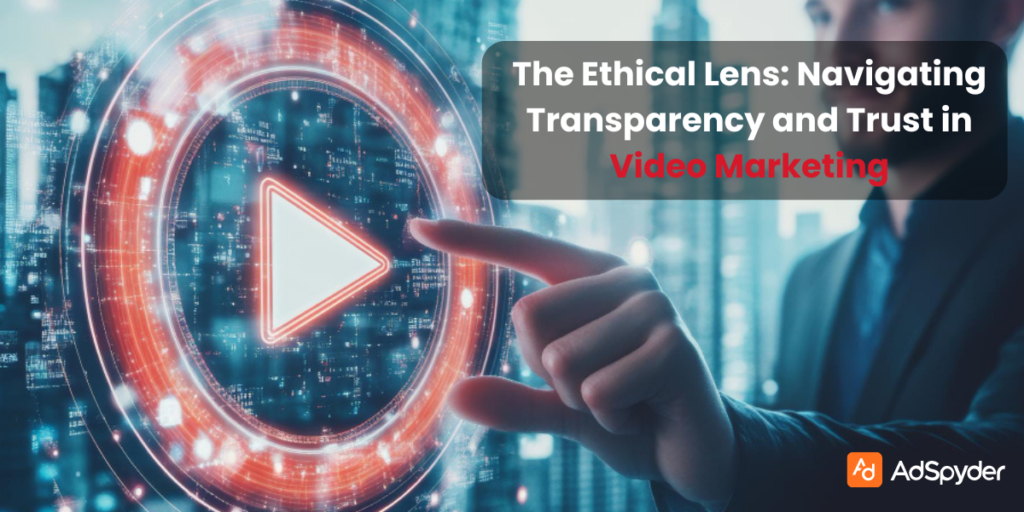The world is now a pool of content where videos are on the top. The ability to tell a story, appealing graphics and narratives – all of this makes video an uncontestable tool for gaining people’s attention and selling brands. Yet, this power is accompanied by a great responsibility – the responsibility to act ethically and to make sure that the techniques used in video marketing are not only efficient but also credible and non-intrusive. This article focuses on the various aspects of video marketing ethics.
Ready to Elevate your Marketing Strategy?
We will address privacy issues, the significance of gaining subjects’ consent, and the issue of misinformation. Let’s break down the tips for being more transparent and gaining the trust of your audience so that the world of video marketing becomes more ethical.
Summary
- Introduction of video marketing ethics
- Ethical Landscape: Major unethical exposes in videos, such as privacy, informed consent, transparency, no false information.
- Privacy: Privacy Concerns specifically about users when creating videos and collecting data.
- Consent Power: This will ensure that all parties involved in the video production process have given informed consent.
- When it comes to sponsorships and product endorsements, it’s in the use of stock footage or music. Transparency is Key: The following are some of the ways through which transparency can be upheld in sponsorships, endorsements, and in the use of stock footage or music. The importance of trust as a key element of the relation between the parties and the ways to establish it, namely by being open and providing reliable information.
- Deceit Avoidance: Refraining from the use of tricks, manipulative editing, lying to the audience, or misleading them.
- Ethical Representation: Diversity in representation and best practices of increasing number of videos by avoiding stereotyping.
- Beyond the Basics: Expanding on the different ethical issues in regard to the use of particular video marketing styles such as testimonial videos, influencer marketing, and user-generated content.
- Building a Culture of Ethics: The section examines how you can bake ethics into the architecture of your video marketing campaign.
- FAQs: A look at some of the most frequently asked questions concerning ethical video marketing.
- Conclusion: To conclude, the need of the hour in video marketing ethics. The last reflections on building trust, the responsible environment of marketing. Conclusion promotes ethical use of strategies in the video marketing strategies amongst the business.
The Ethical Landscape: A Balancing Act
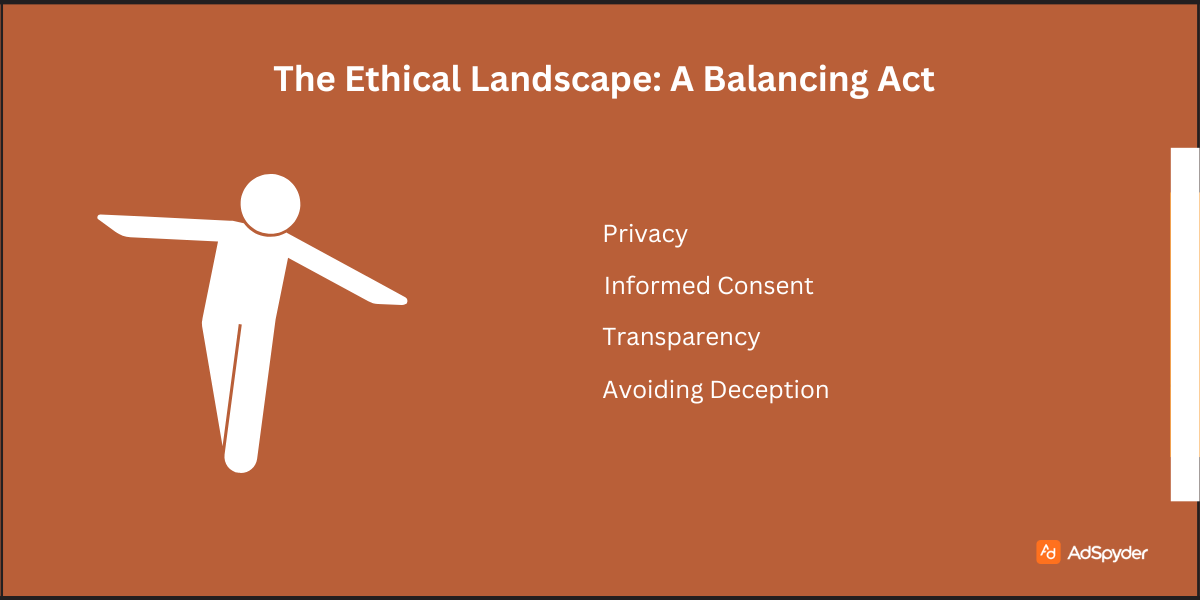
Despite the significant opportunities that the use of videos in marketing presents, there are critical ethical concerns that should be top-priority.
- Privacy: Privacy of users should be ensured at any price. Explain how information is to be collected and seek permission to record people in areas that are open to the public. If possible, remove the user data and follow all the data protection laws that are in force.
- Informed Consent: In cases where the video showcases specific people, ensure that the persons consent to the capturing, use, and sharing of the video materials. In sure terms, inform the participants or viewers how the footage will be utilized
- Transparency: Make sure your followers know when you are partnering with a sponsor or when you are being paid to promote a particular product. Provide any information regarding the financial relationship or partnership of the producer with any other company as portrayed in the video content. Do not employ techniques that are deceptive such as misleading one’s opponents by camouflaging advertisements or having a concealed motive.
- Avoiding Deception: Resist the urge to manipulate viewers through deceptive editing techniques, fake testimonials, or misleading claims. Strive for authenticity and build trust through honest and transparent storytelling.
By prioritizing these ethical considerations, you can ensure your video marketing efforts are not only effective but also responsible and trustworthy.
Protecting Privacy: Building Trust from the Ground Up
Users today consider privacy a fundamental right. Following are some ways that show how video marketing can respect user privacy:
- Data Collection Transparency: Be transparent about what the audience gives you in terms of information and how you would want to use it. Give users control over their own information, as well as provide easy-to-execute “opt-out” options for users wanting to decline preselected information gathering or personalized advertising.
- Filming in Public Spaces: One should consider that whenever you shoot any video in a public domain, it should not offend people who do not want to be part of your video. If their faces are clear and come out properly, you should either pixelate them or obtain permission for filming those people.
- Anonymity Where Applicable: In case users prefer to remain unidentified, grant them anonymity. Users should retain anonymity unless they permit otherwise.
- Data Security: Let the assurance be provided to the user data privacy and not compromised in any way by incorporating appropriate measures to prevent these incidents.
Well, with this practice, it really shows respect for users’ privacy and builds trust with your users. It keeps video marketing a positive and ethical place.
The Power of Consent: Ensuring Informed Participation
When featuring people in your video marketing content, it is essential to get their consent. Here’s how to obtain it effectively:Here’s how to obtain it effectively:
- Clear Communication: It is necessary to state the goal of the shooting, how the video will be used, and through which channels it will be disseminated.
- Right to Opt-Out: Advise people that they are allowed to decline filming or participating at any stage of the filming process.
- Written Consent: At times, it may be necessary to use written consent forms especially where the content being discussed is sensitive or where the interviewee is endorsing a product.
- Consent for Minors: For minors, obtain parental or guardian consent before filming or featuring them in your video content.
By securing informed consent, you ensure all participants understand the implications of their involvement and feel empowered to make informed decisions regarding their participation in your video marketing efforts.
Transparency is Key: Building Trust Through Honesty
Trust is very much an important thing when it comes to dealing with an audience, and transparency will go a long way to create that trust. Here’s how to ensure transparency in your video marketing:
- Disclosing Sponsorships & Partnerships: Inform viewers of any sponsorships, brand partnerships, or paid promotion that may be linked to your video content. You should state these affiliations correctly at the beginning or end of the video.
- Avoiding Hidden Agendas: Do not compromise yourself and do not try to make fake posts or try to hide sponsored posts. Focus on the goals that need to be achieved through marketing and do not mislead the viewers with personal ulterior motives.
- Authentic Storytelling: There should be an emphasis made for the content to be as real as possible or as close to real life as possible. It is vital to allow your brand voice and values to be seen and heard in a clear and truthful manner.
Thus, the adoption of the principles of transparency strengthens the audience’s trust and makes your brand more credible and loyal to ethical approaches to marketing. Not only does this make your brand appear more robust but it also leads to better customer-business relations.
Avoiding Deception: Steering Clear of Misleading Tactics
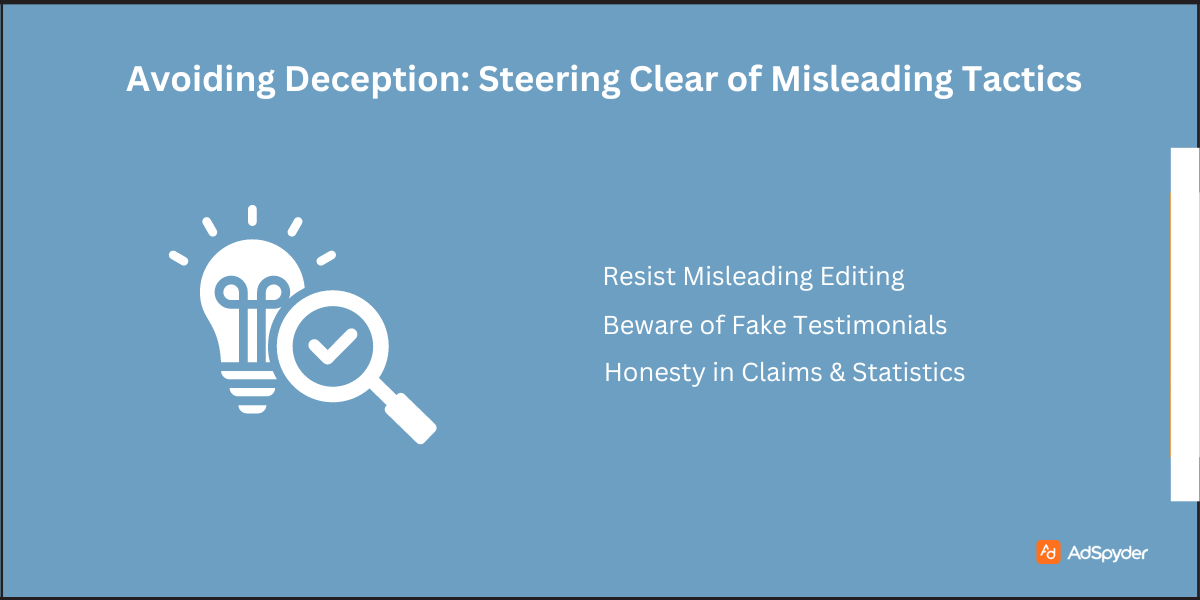
Deceptive practices affect not only the level of trust between a business and a consumer but also the perception of the business itself. Here is how to make sure your video marketing is truthful and not deceptive:
- Deceptive Editing: Avoid the practice of editing created to deceive or distort any fact on any video. Housekeeping should ensure clarity and accuracy in the representation of information.
- Watch out for fake testimonials: one should never use a customer testimonial if this isn’t the real one. Never fabricate fake ones nor distort what users told you in order to create an impression.
- Honesty of claims and statistics: The facts and statistics in your video must be true and exact. Make sure you prove what you say, with valid evidence from reliable sources. Never mislead your viewership with half-truths or overestimated figures.
You, in turn, follow through with ethical and honest marketing practices. This will instill some sense of trust and faith among the audience, who will also view your brand to be very strong. This fosters trust and strengthens your brand image in the eyes of your audience.
Ethical Representation: Diversity and Inclusion Beyond Stereotypes
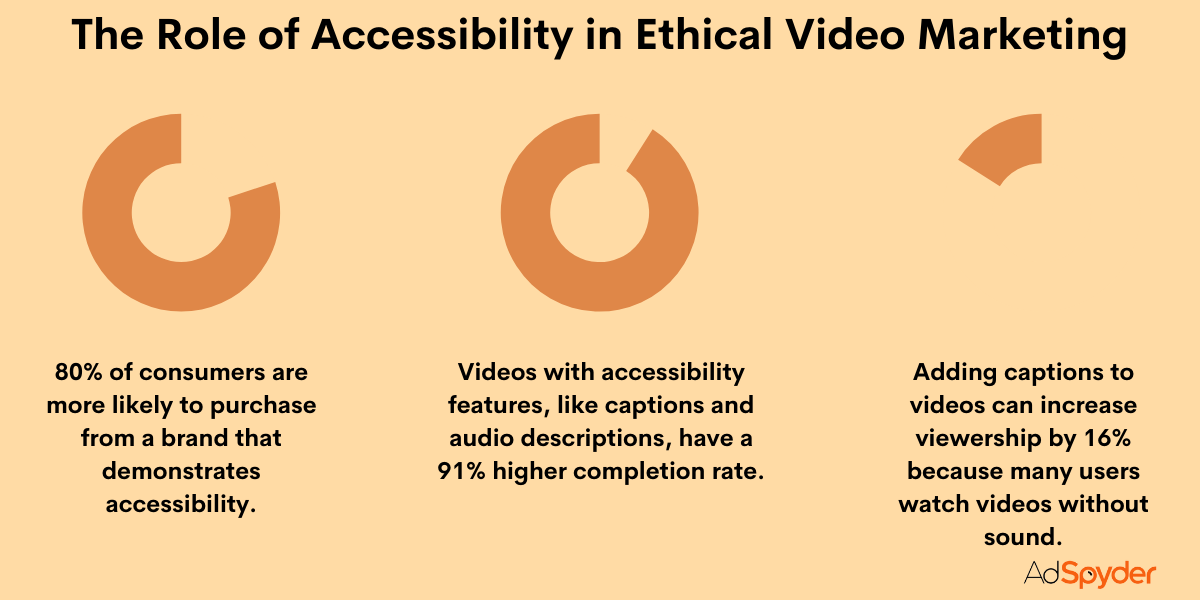
The significance of video marketing is that it tends to reach out to the largest number of people. Here’s how to ensure your video marketing promotes diversity and avoids perpetuating stereotypes:
- Authentic Representation: Ensure that the people featured in your video are as diverse as the target group you are trying to reach. Do not settle for mere visibility and take the next step towards integration.In today’s digital landscape, Facebook ads are a powerful tool for businesses looking to reach their target audience effectively and drive conversions through targeted advertising strategies
- Avoid Stereotypes: Eliminate stereotyping and prejudice by showing the characters as accurately as possible. It is much more effective to focus on unique experiences of people rather than using cliches or references to the general population.
- Cultural Sensitivity: Cultural sensitivity should be observed when developing a video for the global market. Avoid using offensive images or messages. Study the culture to ensure sensitivity and respect.
When your video marketing campaigns are diverse and inclusive, you target more people and portray a good and responsible brand. This helps to create a feeling of rapport and confidence with a larger and more varied clientele.
Check out: Viral Video Marketing: Tips & Tricks for Creating Viral Content 2024
Beyond the Basics: Ethical Considerations in Specific Formats
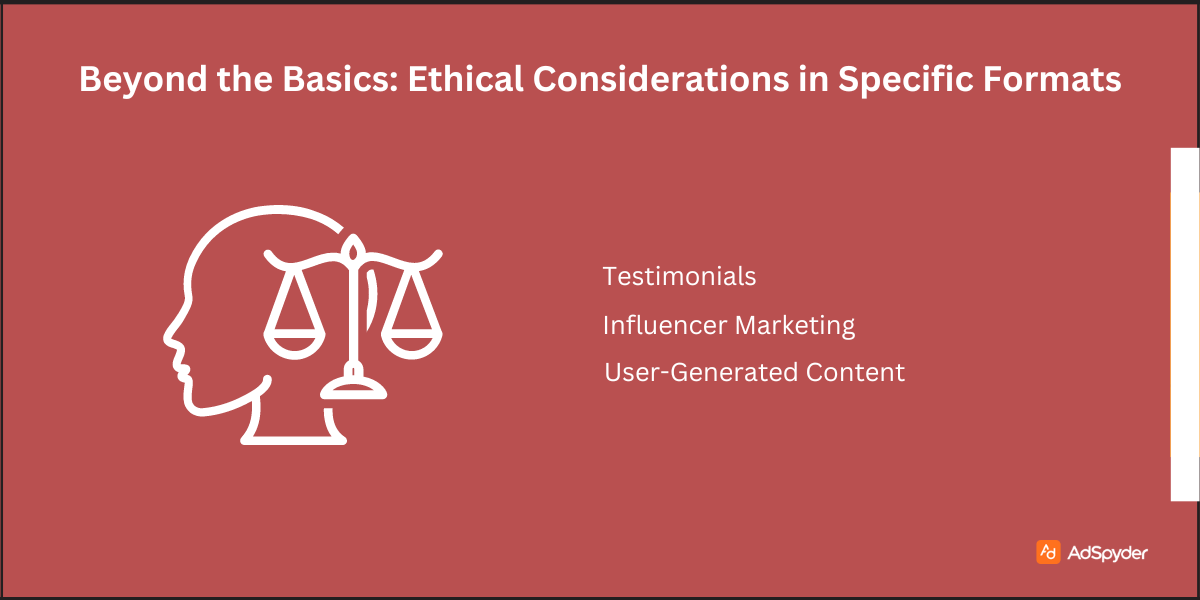
Ethical considerations extend beyond core video production practices. Here’s a look at specific video marketing formats and their ethical implications:
- Testimonials: Ensure that people providing testimonials are not bribed or coerced, and that the content of the testimonials is original. Allow the customers to express genuine experiences they have experienced with the firm, be it good or bad.When setting up your online store, choosing the right payment gateways for dropshipping is essential to ensure secure transactions and a smooth checkout experience for your customers
- Influencer Marketing: Be choosy about finding the right influencer, only collaborating with those whose opinions and values are aligned with your brand. Clearly disclose sponsored posts. Encourage the practice of transparency by influencers declaring that they are working for a brand and discourage fake or hidden endorsements.
- User-Generated Content (UGC): The permission to use such UGC should be asked for, and the material to be pulled is a right to maintain your brand image. Also, stating the terms of use and recognizing a user for an important work of his or her own would be important.
By understanding ethical considerations with specific video marketing formats, you’ll be able to create content that is engaging yet responsible and respectful.
Ethical Considerations for Data-Driven Video Targeting
This table outlines best practices for addressing ethical concerns in data-driven video targeting, ensuring responsible marketing practices.
| Ethical Concern | Best Practice | Benefit |
| User Privacy | Ensure compliance with privacy laws (e.g., GDPR, CCPA) and obtain explicit consent before collecting personal data. | Builds trust and reduces the risk of legal issues. |
| Transparency in Data Usage | Clearly disclose how user data is being collected and used for targeting purposes. | Increases transparency, which improves brand reputation. |
| Avoiding Stereotyping | Use data to personalize content based on behavior rather than demographic assumptions. | Prevents reinforcing harmful stereotypes and enhances content inclusivity. |
| Frequency Capping for Ad Exposure | Limit the number of times a user sees a targeted ad to prevent ad fatigue. | Improves user experience and reduces annoyance, leading to higher engagement. |
| Ensuring Data Accuracy | Regularly update data sources and verify information to ensure targeting accuracy. | Enhances the relevance of ads and minimizes targeting errors. |
Building a Culture of Ethics: Embedding Ethics in Your Strategy
Ethical video marketing is a concept that should guide the process of video marketing. Here’s how to integrate ethics into your approach:
- Develop Ethics Guidelines: Ensure that a full ethical policy guides your video marketing team. They must follow specific guidelines when it comes to consent, transparency, and presentation.
- Educate your team: Let your team know that there’s a right and wrong way to market a video. Ensure all individuals involved in understand your video marketing ethics policy and adhere to it.
- Regular Reviews & Audits: Equally important would be to review or audit on a periodic basis the content developed and used in video marketing for possible ethical issues that may arise. Ethical decision making is actually not a one-time process but rather an ongoing honing and enhancement of your ethical framework.
FAQs
Always check the licensing terms of stock footage before using it. Some require attribution, while others may have restrictions on usage.
Closed captions and transcripts in the videos enable viewers with hearing impairment or those who prefer text-based videos.
If possible, pixelate their face. If the person is a prominent figure in your video, then ask for permission before using the footage.
Ensure that testimonials given by these employees are of free will and not in any manner compelled or coerced. Let them express the real experience.
Never try to hoodwink your target audience by using deep fake or manipulated videos. Be very transparent and candid with your video production and presentation skills.
Deal with them professionally and be courteous. Address valid issues, when raised. Change the video content if necessary.
Several industry associations make resources and guidelines available that can help drive ethical video marketing. Check out resources provided by organizations like the American Marketing Association-AMA, or the World Federation of Advertisers, WFA.
Ethical video marketing is not simply a question of common sense. It’s about considering the potential implications that might come out of your video. It also about whether they will be appropriate for your brand.
Conclusion
Recap
You now have all the knowledge and the resources you need to make an informed decision on the ethical issues of video marketing. We delved into the aspect of ethical concerns. Observe these principles, as defined by the guide. These include, but are not limited to privacy, informed consent, and transparency, non-deception, and ethical portrayal. We also analyzed various types of videos for marketing such as the use of testimonial videos and influencer marketing. The guide also explored use of user-generated content with focus on the ethical issues surrounding the use of these types of videos. The subsequent sections offered guidelines on how to instill a culture of video marketing ethics team.
Final Thoughts
In the world of video marketing, creativity and engagement are the name of the game. However, do not ignore the ethical side. In creating videos, we are responsible for obtaining informed consent, ensuring transparency, and representing accurately. This will help you to develop good relations with your viewers. This helps create trust and enhance brand reputation. It also helps make the marketing environment more ethical for all parties.
Call to Action: Embrace Ethical Video Marketing & Elevate Your Brand
It’s time to put on your newly acquired knowledge and ramp up your video marketing game! Start with these steps:
- Conduct an Ethics Audit: Watch all of your existing video marketing content with an ethical perspective. Find deficiencies that you can see.
- Develop Ethical Guidelines: It is important to set out clear and detailed ethical video marketing rules that your team should follow. Make sure all the people involved in the project are aware and committed to these principles.
- Partner Responsibly: While working with the influencers or using UGC, always consider the ethical factors. Promote clarity in the partnership and protect the user rights.
- Focus on Authenticity: Be true to life and do not trick the viewers with clever editing tricks. Ensure that your brand upholds honesty and good values, visible to the public.
- Continuously Monitor & Adapt: Be aware of the new ethical issues concerning the use of videos in advertising. Always check your practices and change your procedure according to the current practices and policies.
Follow the above steps and ensure that you follow the ethical aspects of video marketing. You can then create powerful videos that appeal to the audiences. It will surely place your brand as the one to go to for ethical marketing. Ethical video marketing is not a mere option nowadays. It is the key to gaining the audience’s trust and achieving sustainable growth.
